Editor's note: Melinda Gates is co-chair of the Bill & Melinda Gates Foundation. This article was published as part of Gates' participation in Women Deliver, an international conference held this week in Kuala Lumpur, Malaysia, focusing on the health and empowerment of girls and women.
(CNN) -- Sometimes a number can put a complicated truth in simple terms. Here's one: 20%. A child whose family budget is controlled by the mother is 20% more likely to survive.
Why? Women know what's best for their families. They make health care, nutritious food and education priorities. But most women in developing countries don't control household budgets, and many also don't control the circumstances of their own lives. If women everywhere had the power to determine their futures, the world would be forever transformed.
 Melinda Gates
Melinda Gates This week I will attend the Women Deliver conference in Kuala Lumpur. I'll be joined by more than 3,000 people who have dedicated their careers to empowering women and girls. The specifics of our work differ, but we're all united by a single, powerful idea: Empowered women and girls will save lives, make families more prosperous and help the poorest countries in the world build stronger economies.
Once you have a child, your career is over? Absolutely not
One key to empowerment—and an issue that's a personal priority for me—is letting women decide when to have children. Right now, more than 200 million women around the world say they don't want to have a child but are not using contraceptives. Some of these women will die from complications of pregnancy. Some will give birth to a child who dies. Many mothers who survive (and have children who survive) won't have the resources to feed or educate them.
More: CNN's 'Girl Rising'
Take, for example, a girl in Niger, where 75% of girls are married before their 18th birthday. Of course, Niger is small and has the highest rate of child marriage in the world, but there are large countries (including Bangladesh, Ethiopia, India and Tanzania, with a total of 1.5 billion people) where more than 40% of girls become brides.
What happens to a child bride from one of these countries? If she can't use contraceptives, she gets pregnant, leaves school and probably never goes back. If she continues having children one after the next—"one on the back and one in the belly," as women have said to me—her health will deteriorate, along with the health of her babies. By the time her children are school age, they are likely to be malnourished and stunted, so even if they go to school, they won't be ready to learn. Unfortunately, there's a real probability that this very same cycle will start again.
.cnnArticleGalleryNav{border:1px solid #000;cursor:pointer;float:left;height:25px;text-align:center;width:25px} .cnnArticleGalleryNavOn{background-color:#C03;border:1px solid #000;float:left;height:25px;text-align:center;width:20px} .cnnArticleGalleryNavDisabled{background-color:#222;border:1px solid #000;color:#666;float:left;height:25px;text-align:center;width:25px} .cnnArticleExpandableTarget{background-color:#000;display:none;position:absolute} .cnnArticlePhotoContainer{height:122px;width:214px} .cnnArticleBoxImage{cursor:pointer;height:122px;padding-top:0;width:214px} .cnnArticleGalleryCaptionControl{background-color:#000;color:#FFF} .cnnArticleGalleryCaptionControlText{cursor:pointer;float:right;font-size:10px;padding:3px 10px 3px 3px} .cnnArticleGalleryPhotoContainer cite{background:none repeat scroll 0 0 #000;bottom:48px;color:#FFF;height:auto;left:420px;opacity:.7;position:absolute;width:200px;padding:10px} .cnnArticleGalleryClose{background-color:#fff;display:block;text-align:right} .cnnArticleGalleryCloseButton{cursor:pointer} .cnnArticleGalleryNavPrevNext span{background-color:#444;color:#CCC;cursor:pointer;float:left;height:23px;text-align:center;width:26px;padding:4px 0 0} .cnnArticleGalleryNavPrevNextDisabled span{background-color:#444;color:#666;float:left;height:23px;text-align:center;width:25px;padding:4px 0 0} .cnnVerticalGalleryPhoto{padding-right:68px;width:270px;margin:0 auto} .cnnGalleryContainer{float:left;clear:left;margin:0 0 20px;padding:0 0 0 10px}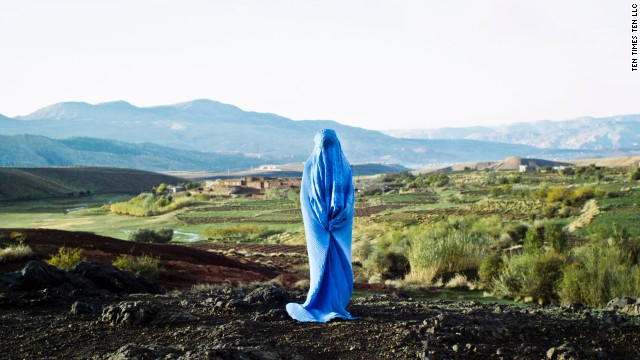 To be born a girl in Afghanistan is often to be ushered into a life of servitude, where girls have very little worth and very dim futures. Amina is forced to marry at 12, to bear a child though still a child herself -- while her own brother is given her dowry money to buy a used car. But Amina, whose name was changed and story portrayed by an actress out of concern for her safety, has had enough, and she is fighting back. CNN Films' "Girl Rising," airing June 16, tells the stories of Amina and other girls from around the world and how the power of education can change the world. Learn more about the girls' inspiring stories. (From 10x10) "What if a girl's life could be more?" When Azmera turned 13, it was time for the Ethiopian girl to be given to a stranger in marriage, like her mother and grandmother before her. But Azmera refused. Azmera is fearful, but she is not alone. She has a champion beside her: an older brother who would give up anything for his sister to be able to stay in school. Together, brother and sister dare to reject her fate. "Poetry is how I turn ugliness into art." La Rinconada, Peru, is a bleak corner of the world that regularly turns out two things: gold from deep within its mountain, which is immediately sent far away; and despair, which remains. Senna's is the poorest of the poor mining families clinging to that mountain. Every day is a struggle. Yet, somehow, she was given two magnificent gifts: a father who named her for a warrior princess and insisted that she goes to school, and a talent with words. And when Senna discovered poetry, everything changed. "Change is like a song you can't hold back." Suma's brothers are sent to school, but her parents have no money for a daughter's education. Given into bonded servitude at age 6, Suma labors in the house of a master from before dawn until late at night. For years, the Nepali girl suffers in silence, until music gives her a voice. A stroke of luck and kindness gives Suma a chance to go to school -- and a crusader is born. "I will come back every day until I can stay." Wadley is 7 years old when the world comes crashing down around her. When Haiti's catastrophic earthquake destroys lives, homes and families, Wadley's happy life with her mother, filled with friends and school, becomes a struggle to survive in a teeming tent city, devastation and grief all around. But Wadley believes she is meant to do something special with her life -- and that the way to begin is by getting back to school. What happens when this irrepressible spirit confronts a system that tells her she is unworthy of an education is an inspiration to the world. "Now there's nothing to stop me. Nothing in the world. Nothing in the universe." Mariama describes herself as a typical teenager, which in itself is remarkable. Her poverty-stricken country, Sierra Leone, is still recovering from a brutal decade of civil war. But Mariama isn't looking back; she is the voice of the future. She is the first in her family to go to school and already has her own radio show and dreams of being a famous scientist and a television star. "He was strong, but I was stronger." An Egyptian girl of 12 whose family can't afford to send her to school has very few options. She can become a street kid; she can become a bride; she can become a target. Yasmin -- whose name was changed and story portrayed by an actress out of concern for her safety -- is lured into the trap of a sexual predator. But what she doesn't become is a victim. Yasmin becomes a superhero. Girl Rising Girl Rising Girl Rising Girl Rising Girl Rising Girl Rising Girl Rising HIDE CAPTION << <
To be born a girl in Afghanistan is often to be ushered into a life of servitude, where girls have very little worth and very dim futures. Amina is forced to marry at 12, to bear a child though still a child herself -- while her own brother is given her dowry money to buy a used car. But Amina, whose name was changed and story portrayed by an actress out of concern for her safety, has had enough, and she is fighting back. CNN Films' "Girl Rising," airing June 16, tells the stories of Amina and other girls from around the world and how the power of education can change the world. Learn more about the girls' inspiring stories. (From 10x10) "What if a girl's life could be more?" When Azmera turned 13, it was time for the Ethiopian girl to be given to a stranger in marriage, like her mother and grandmother before her. But Azmera refused. Azmera is fearful, but she is not alone. She has a champion beside her: an older brother who would give up anything for his sister to be able to stay in school. Together, brother and sister dare to reject her fate. "Poetry is how I turn ugliness into art." La Rinconada, Peru, is a bleak corner of the world that regularly turns out two things: gold from deep within its mountain, which is immediately sent far away; and despair, which remains. Senna's is the poorest of the poor mining families clinging to that mountain. Every day is a struggle. Yet, somehow, she was given two magnificent gifts: a father who named her for a warrior princess and insisted that she goes to school, and a talent with words. And when Senna discovered poetry, everything changed. "Change is like a song you can't hold back." Suma's brothers are sent to school, but her parents have no money for a daughter's education. Given into bonded servitude at age 6, Suma labors in the house of a master from before dawn until late at night. For years, the Nepali girl suffers in silence, until music gives her a voice. A stroke of luck and kindness gives Suma a chance to go to school -- and a crusader is born. "I will come back every day until I can stay." Wadley is 7 years old when the world comes crashing down around her. When Haiti's catastrophic earthquake destroys lives, homes and families, Wadley's happy life with her mother, filled with friends and school, becomes a struggle to survive in a teeming tent city, devastation and grief all around. But Wadley believes she is meant to do something special with her life -- and that the way to begin is by getting back to school. What happens when this irrepressible spirit confronts a system that tells her she is unworthy of an education is an inspiration to the world. "Now there's nothing to stop me. Nothing in the world. Nothing in the universe." Mariama describes herself as a typical teenager, which in itself is remarkable. Her poverty-stricken country, Sierra Leone, is still recovering from a brutal decade of civil war. But Mariama isn't looking back; she is the voice of the future. She is the first in her family to go to school and already has her own radio show and dreams of being a famous scientist and a television star. "He was strong, but I was stronger." An Egyptian girl of 12 whose family can't afford to send her to school has very few options. She can become a street kid; she can become a bride; she can become a target. Yasmin -- whose name was changed and story portrayed by an actress out of concern for her safety -- is lured into the trap of a sexual predator. But what she doesn't become is a victim. Yasmin becomes a superhero. Girl Rising Girl Rising Girl Rising Girl Rising Girl Rising Girl Rising Girl Rising HIDE CAPTION << <  1
1  2
2  3
3  4
4  5
5  6
6  7 > >>
7 > >>  Girl Rising
Girl Rising  Melinda Gates' fight for contraceptives
Melinda Gates' fight for contraceptives 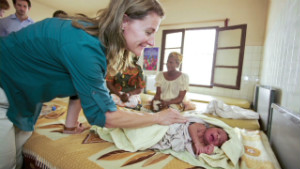 Birth control for the world's women
Birth control for the world's women However, if these girls don't get pregnant and are able to stay in school, everything changes. They will be healthier. Their children will be healthier. Because they finished their schooling, they will be able to earn more money. That money will stretch further, because they will be supporting a smaller family. Their children will be set up to lead a better life than they did, which is the goal of every parent I know.
More: Christiane Amanpour's open letter to girls of the world
Last year, at the London Family Planning Summit, the world came together on a goal to reach 120 million more women and girls around the world with the family planning options they want for their families. Since then, almost two dozen countries have developed plans to make sure women have access to contraceptives.
Family planning is just the start. Women who have the power to decide when to get pregnant also must have the power to vaccinate their children, feed them healthy food and pay their school fees. Each of these things is a link in a chain of good health and prosperity.
Take agriculture. The vast majority of the world's poorest people farm small plots of land to grow their food and earn an income. Women do the majority of the agricultural work across Africa and South Asia, but they don't have equal access to information and farm supplies. As a result, plots of land worked by women generate lower yields than plots worked by men—as much as 40% lower.
If women can get the right training, high-quality seeds and access to irrigation and fertilizer, they will be able to grow more and more nutritious food while producing a surplus they can sell for a profit. Those are resources they can convert into a better life for their children.
Women Deliver is organized around the conviction that women and girls can start a virtuous cycle of development. They just need a little support to get it started. They need to be able to plan their pregnancies. They need to be able to grow enough food to support their families. Once these basics are in place, the only limit is women's ambition for the future.
Follow us on Twitter @CNNOpinion.
Join us on Facebook/CNNOpinion.
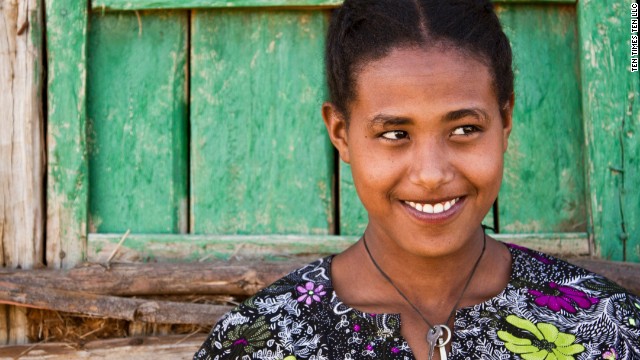 "What if a girl's life could be more?" When Azmera turned 13, it was time for the Ethiopian girl to be given to a stranger in marriage, like her mother and grandmother before her. But Azmera refused. Azmera is fearful, but she is not alone. She has a champion beside her: an older brother who would give up anything for his sister to be able to stay in school. Together, brother and sister dare to reject her fate.
"What if a girl's life could be more?" When Azmera turned 13, it was time for the Ethiopian girl to be given to a stranger in marriage, like her mother and grandmother before her. But Azmera refused. Azmera is fearful, but she is not alone. She has a champion beside her: an older brother who would give up anything for his sister to be able to stay in school. Together, brother and sister dare to reject her fate. 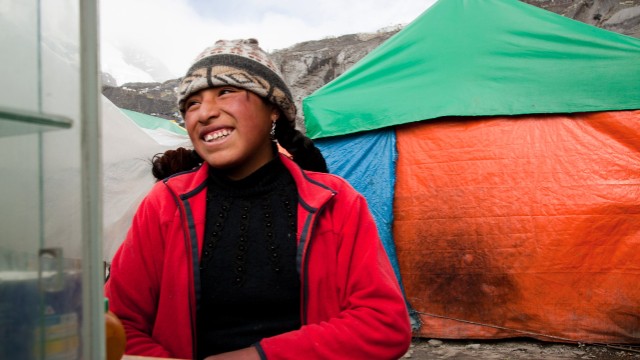 "Poetry is how I turn ugliness into art." La Rinconada, Peru, is a bleak corner of the world that regularly turns out two things: gold from deep within its mountain, which is immediately sent far away; and despair, which remains. Senna's is the poorest of the poor mining families clinging to that mountain. Every day is a struggle. Yet, somehow, she was given two magnificent gifts: a father who named her for a warrior princess and insisted that she goes to school, and a talent with words. And when Senna discovered poetry, everything changed.
"Poetry is how I turn ugliness into art." La Rinconada, Peru, is a bleak corner of the world that regularly turns out two things: gold from deep within its mountain, which is immediately sent far away; and despair, which remains. Senna's is the poorest of the poor mining families clinging to that mountain. Every day is a struggle. Yet, somehow, she was given two magnificent gifts: a father who named her for a warrior princess and insisted that she goes to school, and a talent with words. And when Senna discovered poetry, everything changed. 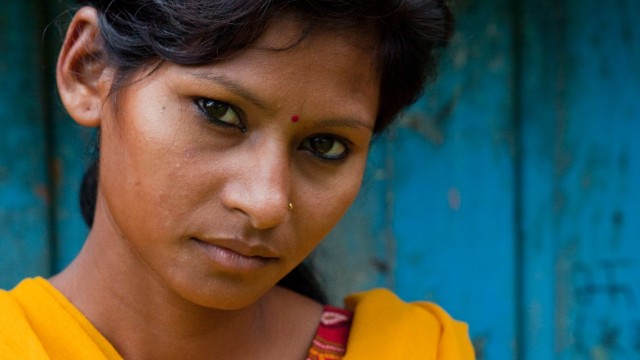 "Change is like a song you can't hold back." Suma's brothers are sent to school, but her parents have no money for a daughter's education. Given into bonded servitude at age 6, Suma labors in the house of a master from before dawn until late at night. For years, the Nepali girl suffers in silence, until music gives her a voice. A stroke of luck and kindness gives Suma a chance to go to school -- and a crusader is born.
"Change is like a song you can't hold back." Suma's brothers are sent to school, but her parents have no money for a daughter's education. Given into bonded servitude at age 6, Suma labors in the house of a master from before dawn until late at night. For years, the Nepali girl suffers in silence, until music gives her a voice. A stroke of luck and kindness gives Suma a chance to go to school -- and a crusader is born. 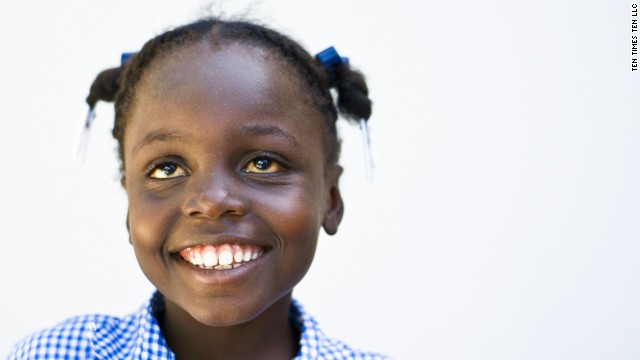 "I will come back every day until I can stay." Wadley is 7 years old when the world comes crashing down around her. When Haiti's catastrophic earthquake destroys lives, homes and families, Wadley's happy life with her mother, filled with friends and school, becomes a struggle to survive in a teeming tent city, devastation and grief all around. But Wadley believes she is meant to do something special with her life -- and that the way to begin is by getting back to school. What happens when this irrepressible spirit confronts a system that tells her she is unworthy of an education is an inspiration to the world.
"I will come back every day until I can stay." Wadley is 7 years old when the world comes crashing down around her. When Haiti's catastrophic earthquake destroys lives, homes and families, Wadley's happy life with her mother, filled with friends and school, becomes a struggle to survive in a teeming tent city, devastation and grief all around. But Wadley believes she is meant to do something special with her life -- and that the way to begin is by getting back to school. What happens when this irrepressible spirit confronts a system that tells her she is unworthy of an education is an inspiration to the world. 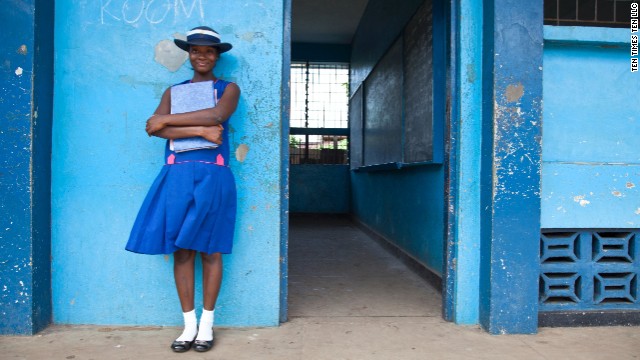 "Now there's nothing to stop me. Nothing in the world. Nothing in the universe." Mariama describes herself as a typical teenager, which in itself is remarkable. Her poverty-stricken country, Sierra Leone, is still recovering from a brutal decade of civil war. But Mariama isn't looking back; she is the voice of the future. She is the first in her family to go to school and already has her own radio show and dreams of being a famous scientist and a television star.
"Now there's nothing to stop me. Nothing in the world. Nothing in the universe." Mariama describes herself as a typical teenager, which in itself is remarkable. Her poverty-stricken country, Sierra Leone, is still recovering from a brutal decade of civil war. But Mariama isn't looking back; she is the voice of the future. She is the first in her family to go to school and already has her own radio show and dreams of being a famous scientist and a television star. 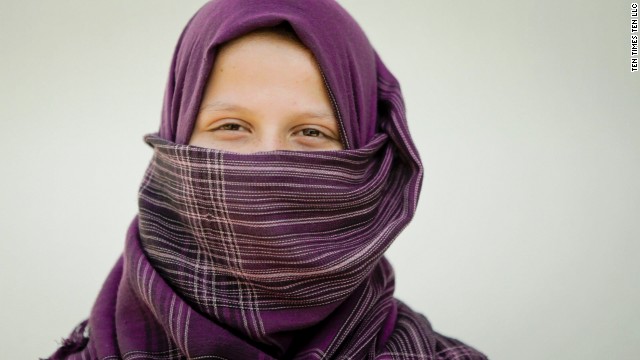 "He was strong, but I was stronger." An Egyptian girl of 12 whose family can't afford to send her to school has very few options. She can become a street kid; she can become a bride; she can become a target. Yasmin -- whose name was changed and story portrayed by an actress out of concern for her safety -- is lured into the trap of a sexual predator. But what she doesn't become is a victim. Yasmin becomes a superhero. Girl Rising Girl Rising Girl Rising Girl Rising Girl Rising Girl Rising Girl Rising HIDE CAPTION << <
"He was strong, but I was stronger." An Egyptian girl of 12 whose family can't afford to send her to school has very few options. She can become a street kid; she can become a bride; she can become a target. Yasmin -- whose name was changed and story portrayed by an actress out of concern for her safety -- is lured into the trap of a sexual predator. But what she doesn't become is a victim. Yasmin becomes a superhero. Girl Rising Girl Rising Girl Rising Girl Rising Girl Rising Girl Rising Girl Rising HIDE CAPTION << <
{ 0 comments... read them below or add one }
Post a Comment